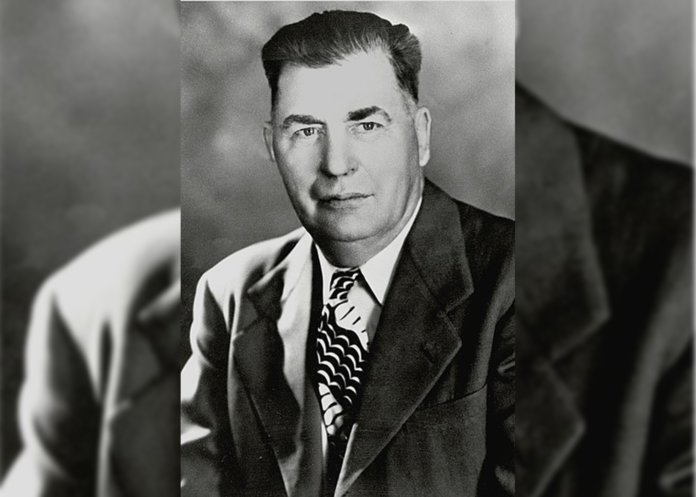
Martial law has been declared roughly 65 times in U.S. history. In Colorado, it’s been done a handful of times alone — but one of the most well-known occurrences was in 1936 by former Gov. Edwin “Big Ed” Johnson in an attempt to close the state’s border with New Mexico.
According to a September 2020 Lost Highways podcast episode, Johnson was “one of the most beloved politicians in all of Colorado’s history, [and] established martial law on Colorado’s southern border to keep out what he called ‘the Mexican Menace.’”
The former governor deployed 50 National Guardsmen to the southern boundary, according to University of Denver Sturm College of Law professor Tom Romero in the podcast episode. Romero went on to say there are pictures of National Guard members with big machine guns in trucks chasing down people attempting to cross the border into Colorado.
Romero, who’s also an advisor for the History Colorado podcast, focuses his curriculum and research on the legal history of the American West, with an “emphasis on the relationship between race and water law, school desegregation, property, land use, and urban development and local government,” according to his online biography.
In March 1935, one year before the 1936 declaration, Colorado Springs Farm News published coverage of Johnson threatening mass deportation and calling out the National Guard. In an address, the outlet reported Johnson claimed there were “aliens in Colorado living on relief or holding jobs which should be filled by American citizens” The outlet went on to note “The situation, the chief executive pointed out, has resulted from the severe drouths in southeastern states and in old Mexico, forcing the alien population to seek other areas for their livelihood.”
At the time, the jobs Johnson was referring to were mostly in sugar production via sugar beets. Colorado in the 1920s was the state that produced the most sugar and most sugar beet farms relied on seasonal and migrant workers to maintain that level of production. Romero noted in the Lost Highways episode that, because of various shady land practices by the U.S. government at the time, “Mexican Americans who no longer have access to land are now sort of forced into wage labor.” In the time before many of the modern labor laws, workers could be exploited and forced into brutal labor contracts, the podcast hosts explained.
In the Lost Highways podcast episode, Romero said Johnson “was hoping the federal government would be a partner with him in [the border closure],” but he didn’t find support federally. “Yeah, you’re talking about people that are coming to the state that are just looking for jobs like anybody else,” Romero went on to note, saying the federal government’s policy wasn’t “to punish the hungry and those that, you know, are trying to make a better life for themselves.”
Following Johnson’s 1935 address, a truck of seasonal workers tried to enter the state with letters from their employers asking them to return for sugar beet season, and the workers were all detained. After just a few days, the workers came back to Colorado and reported the situation to the Mexican Consulate in Denver, Romero said on the podcast, leading to “a little bit of [an] international incident.”
Nearly one year to the day after that incident, Johnson declared martial law. Romero said on the podcast that Rocky Mountain News reporters “covered this incident in which the National Guard pulled five people off of a train and four of them were Mexican or Mexican-Americans.” Romero noted one of the people who was on the train was a white, disabled, American veteran.
“I think it highlights for me the larger racial politics that are at play,” Romero said in the episode.
According to Romero, Johnson’s plan was losing traction quickly after the Rocky Mountain News coverage. Coloradans also weren’t rushing to fill those jobs as Johnson had expected. “And in fact, the jobs were remaining empty,” Romero noted. According to a state document about his life and career, Johnson was pressured by federal and other public officials to reverse his declaration but reinstituted his labor ban in 1958.
The political embarrassment didn’t dampen Johnson’s career. According to a state record, Johnson was the only person in Colorado to serve three terms as governor and he also served three terms as a U.S. senator. The state document describes Johnson as an isolationist who was known for his “political vacillations, which were largely caused by his allegiances being split between the Democratic Party and his Republican constituency.”
Many may also be familiar with Johnson because of his famous and public criticism of American actress Ingrid Bergman in 1950 following her extramarital affair. He introduced legislation that would have required movie performers to be licensed based on their perceived morality. According to a state record, “This legislation was introduced after Johnson publicly called Ingrid Bergman ‘an apostle of degradation’ and her lover/director Roberto Rossellini ‘vile and unspeakable…’” Johnson also allegedly said, “Unconventional free-love conduct must be regarded … as an assault upon the institution of marriage.”
Johnson died in May 1970 at age 86, following a long political career spanning more than three decades.

